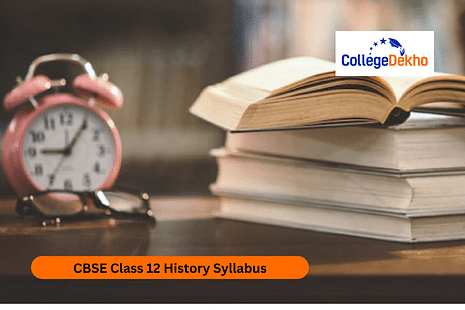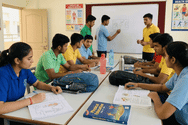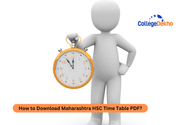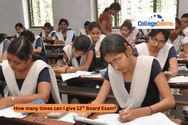- CBSE Class 12 History Syllabus 2025-26 PDF
- CBSE Class 12 History Syllabus 2025-26: Exam Pattern
- CBSE Class 12 History Syllabus 2025-26
- CBSE Class 12 History Syllabus 2025-26: Theme-Wise
- CBSE Class 12 History Syllabus 2025-26: Maps
- CBSE Class 12 History Syllabus 2025-26 Weightage Based on Competencies
- CBSE Class 12 History Syllabus 2025-26 List of Projects
- How To Download CBSE Class 12 History Syllabus 2025-26 from …
- CBSE Class 12 History Deleted Syllabus
- CBSE Class 12 History Exam Pattern 2025-26
- CBSE Class 12 History Syllabus 2025-26: Question Paper Design
- CBSE Class 12 History Reference Books 2025-26
- Faqs


Never Miss an Exam Update
CBSE Class 12 History Syllabus 2025-26 has been released by CBSE at cbseacademic.nic.in
. The Class 12th History syllabus is divided into three themes each carrying 25 marks, Themes in Indian History Part-I, Themes in Indian History Part—II, and Themes in Indian History Part—III. The themes are further divided into 12 chapters, where each theme will consist of 4 chapters. There will be Map as well for 5 marks. The entire CBSE 12th Historyt syllabus 2025-26 revolves round Ancient, Medieval, and Modern History. The History exam will be conducted for 100 marks where 80 marks are allotted for theory exam and 20 marks for the internal assessment. By referring to the CBSE Class 12 History Syllabus PDF, students can get a good understanding of the marks assigned to each chapter which will enable them to concentrate more on the topics that carry the most marks.
The CBSE Class 12 Board 2025-26 has prescribed 4 textbooks -Ancient India by Ram Sharan Sharma, Modern India History by Vipin Chandra, Medieval India Old Ncert History By Satish Chandra, and Contemporary World History. Along with the syllabus, students must also refer to the
CBSE 12th Exam Pattern 2025-26
to know the marking scheme and the type of questions asked, among other things. Read the article to know more about the detailed CBSE Class 12 History Syllabus 2025-26 .
CBSE Class 12 History Syllabus 2025-26 PDF
Students can download the CBSE Syllabus for Class 12 History 2025-26 by clicking on the link given here. Make sure to refer to the syllabus PDF and start the preparations for the board exams:
| CBSE Class 12 History Syllabus 2025-26 PDF |
|---|
CBSE Class 12 History Syllabus 2025-26: Exam Pattern
Students can refer to the exam pattern for the CBSE 12th History Question Paper from the table given below. Try to focus on completing the syllabus on time to score a good percentage. Make time for each unit according to the weightage allotted here:
No | Part | Marks |
|---|---|---|
1 | Themes in Indian History Part--I | 25 |
2 | Themes in Indian History Part--II | 25 |
3 | Themes in Indian History Part--III | 25 |
4 | Map | 05 |
TOTAL | 80 |
CBSE Class 12 History Syllabus 2025-26
The various themes in CBSE Class 12 History syllabus 2025-26 have been shown in the given table. Students must have proper knowledge about the historical events that will be covered in the syllabus for effective preparation.
Themes in Indian History Part—I 25 Marks | ||
|---|---|---|
Theme No. | Theme Title | Marks |
1 | Bricks, Beads and Bones The Harappa Civilisation | 25 |
2 | Kings, Farmers, and Towns Early States and Economies (c.600 BCE600 CE) | |
3 | Kingship, Caste, and Class Early Societies (c. 600 BCE600 CE) | |
4 | Thinkers, Beliefs, and Buildings Cultural Developments (c. 600 BCE600 CE) | |
Themes in Indian History Part—II 25 Marks | ||
5 | Through the Eyes of Travellers Perceptions of Society (c. tenth to seventeenth centuries) | 25 |
6 | Bhakti-Sufi Traditions Changes in Religious Beliefs and Devotional Texts (c. eighth to eighteenth centuries) | |
7 | An Imperial Capital – Vijayanagar (c. fourteenth to sixteenth centuries) | |
8 | Peasants, zamindars, and the States Agrarian Society and the Mughal Empire (c. sixteenth-seventeenth centuries) | |
Themes in Indian History Part—III 25 Marks | ||
9 | Colonialism and The Countryside Exploring Official Archives | 25 |
10 | Rebels and Raj 1857 Revolt and its Representations | |
11 | Mahatma Gandhi and the National Movement Civil Disobedience and Beyond | |
12 | Framing of the Constitution The Beginning of a New Era | |
Including Map work of the related Themes | 05 | |
Theory Total | 80 | |
Project Work | 20 | |
100 | ||
CBSE Class 12 History Syllabus 2025-26: Theme-Wise
The theme-wise CBSE Class 12 History Syllabus 2025-26 is given in the table below. Complete the syllabus on time and also make time for revision by downloading the CBSE Class 12 Sample Paper 2025-26 :
Theme No. and Title | Learning outcome with specific competencies |
|---|---|
Themes in Indian History Part—I | |
1 BRICKS, BEADS AND BONES The Harappan Civilisation | To investigate, research, and analyze the early urban centers and social frameworks. To understand the first civilization in history, list and extrapolate the multifaceted elements of the Harappan civilization. Investigate, analyze, and synthesize ASI and historians' perspectives on Harappa using historical and modern sources. |
2. KINGS, FARMERS AND TOWNS: Early States and economies (c.600 BCE 600 CE) | To evaluate, analyze, and interpret significant trends in the subcontinent's political and economic history. Decipher inscriptional evidence. Examine inscriptional evidence and how it has influenced how political and economic processes are considered. |
3. KINSHIP, CASTE AND CLASS, Early Societies (c. 600 BCE600 CE) | To examine, and analyse the issues of social history. Examine social conventions to comprehend the ideas of society described in ancient Indian scriptures. Examine the several facets that historians have looked into to comprehend the Mahabharata's dynamic method. |
4. THINKERS, BELIEFS, AND BUILDINGS Cultural Development (c. 600 BCE600 CE) | To ponder on and contrast the main religious movements in ancient India. Explain the intricate religious sculpture and deduce the secret tales from it. |
To create a picture album of the Buddhist sculpture | |
Themes in Indian History Part—II | |
5 THROUGH THE EYES OF TRAVELLERS: Perceptions of Society (c. tenth to seventeenth centuries) | To comprehend the key elements of the social histories that the travelers have portrayed and to put what one has learned into practice. Clarifying the traveler's stories from other countries to comprehend social, political, and economic life under the many kings of the medieval era. Compare and contrast the opinions on Indian society held by Al Biruni, Ibn Battuta, and Bernier. |
6. BHAKTI –SUFI TRADITIONS: Religious and devotional beliefs have changed from the ninth to the eighteenth centuries. | Recognize the developments in religion. Summarize the teachings of various Bhakti and Sufi saints to comprehend the evolution of religion during the Middle Ages. Recognize the religious movement to promote societal harmony, peace, and fraternity. |
7. AN IMPERIAL CAPITAL: VIJAYANAGARA (c. fourteenth to sixteenth centuries | To understand the diversity of the combined cultures of Deccan India, students will be able to classify the various architectural contributions of the Vijayanagar kingdom. Examine foreign visitors' reports of Vijayanagar to assess the political, social, and cultural life of the city. Evaluate and respect the city planning, the water management system, and the rulers' leadership. |
8. PEASANTS, ZAMINDARS, AND THE STATE: Agrarian Society and the Mughal Empire (c. sixteenth seventeenth centuries) | Understanding the elements of agrarian advances can help you comprehend how the Mughal government interacted with agriculture. the agrarian developments that took place in the sixteenth and seventeenth centuries. Make a table and bring out the differences in the agrarian sector. |
Themes in Indian History Part—III | |
09. COLONIALISM AND THE COUNTRYSIDE: Exploring Official Archives | To comprehend the economic ramifications of colonialism in India, consider the revenue structures that the British instituted. To comprehend the conflicting interests of the British and Indians, analyze the official records and reports from the colonial era. Identify measures that can be taken in this century to protect farmers and craftspeople. |
10. REBELS AND THE RAJ: 1857 Revolt and its Representations | To examine the events of 1857. To determine the scope and type of the 1857 rebels' planning and cooperation, compare them. To comprehend the spread of the revolt, look at its momentum. Examine how the Indian uprising sparked a sense of national solidarity. Interpret visual representations to comprehend the feelings that nationalist and British portray. |
11. MAHATMA GANDHI AND THE NATIONALIST MOVEMENT: Civil Disobedience and Beyond | Understand the nationalist movement in chronological order. Compare and contrast the key components of the nationalist movement with the characteristics of the Gandhian-led institutions, people, and ideas. Discuss Gandhi's major accomplishments to comprehend his nationalism's broad appeal. Discover several approaches to understanding historical sources like newspapers, biographies, autobiographies, diaries, and letters. |
12. FRAMING THE CONSTITUTION: The Beginning of a New Era | Highlight the role of the Constituent Assembly to understand functionaries in framing the constitution of India. Analyze how debates and discussions around important issues in the Constituent Assembly shaped our Constitution |
CBSE Class 12 History Syllabus 2025-26: Maps
CBSE Class 12 History syllabus is a thorough and difficult study. It includes a sizable practical component that enables students to apply their theoretical knowledge to actual real-world circumstances. It covers a wide range of themes, from the ancient to the current. The mapping of the CBSE Class 12 History syllabus for 2025-26 is shown in the table below.
Books | Page number details | Map work |
|---|---|---|
Book 1 | Page 2 | Harappa, Banawali, Kalibangan, Balakot, Rakhigarhi, Dholavira, Nageshwar, Lothal, Mohenjodaro, Chanhudaro, and KotDiji are mature Harappan sites. |
Page 30 | Vajji, Magadha, Kosala, Kuru, Panchala, Gandhara, Avanti, Rajgir, Ujjain, Taxila, and Varanasi are among the cities that make up Mahajanapada. | |
Page 33 | Ashokan inscriptions are spread among the Kushana, Shaka, Satavahana, Vakataka, and Gupta civilizations. Cities/towns: Kaushambi, Sanchi, Topra, Meerut Pillar, Mathura, Kannauj, Puhar, and Braghukachchha Pillar Inscriptions. Chola, Chera, and Pandyan kingdoms. | |
Page 43 | Important kingdoms and towns: Guptas, Kushanas, Shakas, Satavahanas, and Vakatakas. Mathura, Kanauj, Puhar, Braghukachchha, Shravasti, Rajgir, Vaishali, Varanasi, and Vidisha are some of the cities/towns. | |
Page 95 | Major Buddhist Sites: Amaravati, Lumbini, Nasik, Nagarjunakonda, Sanchi, Bharhut, BodhGaya, Shravasti, Ajanta. | |
Book 2 | Page 174 | Vijayanagar, Chandragiri, Kanchipuram, Bidar, Golconda, Bijapur, Mysore, Thanjavur, Kolar, Tirunelveli, Quilon. |
Page 214 | Delhi, Agra, Panipat, Amber, Ajmer, Lahore, and Goa were among the territories ruled by Babur, Akbar, and Aurangzeb. | |
Book 3 | Page 297 | Punjab, Sindh, Bombay, Madras Fort St. David, Bengal, Bihar, Orissa, Masulipatam, Berar, Avadh, Surat, Calcutta, Daccan, Patna, Benaras, Allahabad, and Lucknow were all territories or cities that were under British control in 1857. |
Page 297 | In 1857, the following regions and cities were under British rule: Punjab, Sindh, Bombay, Madras Fort St. David, Bengal, Masulipatam, Berar, Bihar, Orissa, Avadh, Surat, Calcutta, Daccan, Patna, Benaras, Allahabad, and Lucknow. | |
Page 305 | Main centers of the Revolt of 1857: Delhi, Meerut, Jhansi, Lucknow, Kanpur, Azamgarh, Calcutta, Benaras, Gwalior, Jabalpur, Agra, Avadh. | |
Centers of the National Movement that are important: Champaran, Kheda, Ahmedabad, Benaras, Amritsar, ChauriChaura, Lahore, Bardoli, Dandi, Bombay (Quit India Resolution), and Karachi are among the examples. |
CBSE Class 12 History Syllabus 2025-26 Weightage Based on Competencies
Refer to the table below to know the competency based weightage of CBSE Class 12 History Syllabus for the academic year 2025-26:| Competencies | Marks | Percentage |
|---|---|---|
| Knowledge- Remembering previously learned material by recalling facts, terms, basic concepts, and answers. | 21 | 26.25 |
| Understanding- demonstrating understanding of facts and ideas by organizing, translating, interpreting, giving descriptions and stating main ideas. | 18 | 22.50 |
| Applying and Analyzing- applying acquired knowledge, facts, techniques and rules and solving the problems. | 24 | 30 |
| Formulating, Evaluating and Creating skills- Examining, making inferences and finding evidence to support generalizations; Presenting and defending opinions by making judgments about information and piling information | 12 | 15 |
| Map skills | 05 | 6.25 |
CBSE Class 12 History Syllabus 2025-26 List of Projects
Few suggestive topics for projects that are included in the CBSE Class 12 History Syllabus 2025-26:- The Indus Valley Civilization-Archaeological Excavations and New Perspectives
- The History and Legacy of Mauryan Empire
- “Mahabharat”- The Great Epic of India
- The History and Culture of the Vedic period
- Buddha Charita
- A Comprehensive History of Jainism
- Bhakti Movement- Multiple Interpretations and Commentaries.
- The Mystical Dimensions of Sufism Global Legacy of Gandhian Ideas
- The Architectural Culture of the Vijayanagar Empire
- Life of Women in the Mughal Rural Society
- Comparative Analysis of the Land Revenue Systems Introduced by the Britishers in India
- The Revolt of 1857- Causes; Planning & Coordination; Leadership, Vision of Unity
- The Philosophy of Guru Nanak Dev
- The Vision of Kabir
- An Insight into the Indian Constitution
- Comparative Study of Stupas and Pillar Edicts
- Comparative Study of Mughal and Vijayanagar Architecture
How To Download CBSE Class 12 History Syllabus 2025-26 from the Official Website?
A simple procedure can be followed by the students when they want to download the PDF of the CBSE Class 12 History Syllabus 2025-26. Check the steps that you need to consider from the pointers given below:- Step 1: The students must first have to visit the official website of CBSE Academics at cbseacademic.nic.in
- Step 2: The homepage will open where they will have to click on the option called Curriculum on the menu bar.
- Step 3: A dropdown menu will appear. Students must now click on the option called Curriculum 2025-26
- Step 4: On the new page, click on the option called Senior Secondary Curriculum (XI-XII)
- Step 5: Select the option called Academic Electives - (Group-A)
- Step 6: Click on the History option to download the PDF.
CBSE Class 12 History Deleted Syllabus
Examine the following table to verify the CBSE Class 12 History Deleted Syllabus 2025-26 :| Chapter | Part | Topic | Page No. | Deleted Topics |
|---|---|---|---|---|
| 9 | Themes in Indian History Part-II | The Mughal Court: Reconstructing Histories through Chronicles | 224-256 | Full Chapter |
| 10 | Themes in Indian History Part-III | Colonialism and Rural Society: Evidence from Official Reports | Overview: East India Company; revenue settlements across India's regions; surveys alterations during the nineteenth century Excerpts: Frances Buchanan-Hamilton's accounts and the Deccan Riots report | |
| 12 | Themes in Indian History Part-III | Colonialism & Indian Towns: Town Plans and Municipal Reports | 316-345 | Full Chapter |
| 14 | Themes in Indian History Part-III | Partition through Oral Sources | 376-404 | Full Chapter |
| Book 3 | List Of Maps | Book 3 | 297 | Deccan, Chittagong |
CBSE Class 12 History Exam Pattern 2025-26
The pattern for the Class 12 History question paper from CBSE, along with the marks assigned to each section, is displayed in the following table.
| Section | Question No. | Type of Questions | Marks Allocated per Question | Total Marks |
|---|---|---|---|---|
| Section A | 1-21 | MCQs | 1 | 21 |
| Section B | 22-27 | Short Answer Type Questions | 3 | 18 |
| Section C | 28-30 | Long Answer Type Questions | 8 | 24 |
| Section D | 31-33 | Source-based Questions (three sub-questions) | 4 | 12 |
| Section E | 34 | Map-based Questions | 5 | 5 |
| Total Marks | 80 | |||
CBSE Class 12 History Syllabus 2025-26: Question Paper Design
The table below comprises the question paper design of the CBSE Class 12 History Syllabus 2025-26 . Refer to this design when making the study plan for your preparations and allot enough time for each unit:
Book | MCQ | SA | LA | Source Based | Map | Total | |||||
|---|---|---|---|---|---|---|---|---|---|---|---|
– | No of Questions | MM | No of Questions | MM | No of Questions | MM | No of Questions | MM | – | Theory | |
Part 1 | 7 | 1 | 2 | 3 | 1 | 8 | 1 | 4 | – | 25 | |
Part 2 | 7 | 1 | 2 | 3 | 1 | 8 | 1 | 4 | – | 25 | |
Part 3 | 7 | 1 | 2 | 3 | 1 | 8 | 1 | 4 | – | 25 | |
Map | – | – | – | – | – | – | – | – | 05 | 05 | |
Project | – | – | – | – | – | – | – | – | – | 80 | |
Total | 7x 3=21 | 6x 3=18 | 3x 8= 24 | 3x4=12 | 1x5=5 | 100 marks | |||||
CBSE Class 12 History Reference Books 2025-26
Here's a list of CBSE Class 12 History reference books along with brief descriptions:| Books | Description |
|---|---|
| India's Struggle for Independence by Bipin Chandra | An extensive history of the Indian liberation movement from the late nineteenth century to 1947 is provided in this book. It looks at the different movements, leaders, philosophies, and eras that influenced India's path to freedom. |
| Modern India by Bipin Chandra | This book, which focuses on modern Indian history, spans the years from the middle of the 1800s until the brink of freedom. It examines important events in politics, society, the economy, and culture during this pivotal time. |
| History of Medieval India by Satish Chandra | From the seventh to the seventeenth century, Indian medieval history is thoroughly examined in this book. It looks at the social, political, cultural, and economic facets of Indian society in the Middle Ages. |
| History of Modern World by Jain & Mathur | This book, which offers a worldwide viewpoint, discusses significant occurrences, trends, and advancements in world history from the eighteenth century to the present. It talks about how globalization, nationalism, industrialization, and imperialism have affected many parts of the world. |
| Mastering Modern World History by Norman Lowe | This book offers a thorough analysis of contemporary world history with an emphasis on significant occasions, figures, and ideas. It aids in students' comprehension of the interdependence of world historical processes and their importance in creating the modern world. |
| The Story of Civilization by Arjun Dev | The Story of Civilization, provides a thorough account of world history spanning numerous civilizations and eras. It offers perceptions into the political, social, and cultural aspects of human history from antiquity to the present. |
CBSE Class 12 History Syllabus 2025-26 must be downloaded before going forward with your preparations for the board exams. Check all the details of the syllabus here to kick-start your studies now.
FAQs
For CBSE Class 12 History, there are 100 total marks. The theory exam will carry 80 marks and 20 marks are for the project work. Students need to score 33% marks to pass the exam.
Deccan and Chittagong are topics removed from the CBSE Class 12 History Syllabus under the Maps Section.
Yes, the CBSE Class 12 History Syllabus no longer includes the following chapters:
Chapter 9: The Mughal Court
Chapter 12: Colonialism and Indian Towns
Chapter 14: Partition via Oral Sources
Yes, the CBSE History syllabus for class 12th is the same for the annual board exams and compartment exams.
The CBSE 12th History syllabus 2024-25 has been released in the form of a PDF. One may download it and use it as needed. It is not necessary to take a print out.
To download CBSE Class 12 History syllabus 2024-25 you can click on the History direct syllabus pdf download links given in this article or can download it from the official website.
As of now, CBSE 12th History Syllabus 2024 has not been reduced for the academic year 2023-24. Latest syllabus link for CBSE Class 12 History syllabus has been given in the article above.
Yes, all the schools which are affiliated to CBSE follow the same CBSE 12th History exam syllabus 2025 as prescribed by CBSE on their website.

























